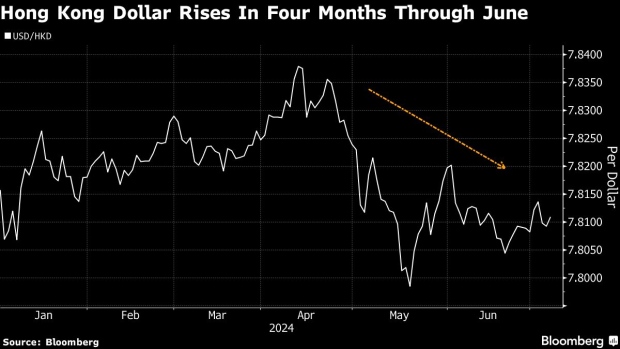(Bloomberg) — The Hong Kong dollar’s gains against the greenback are expected to peak this month, after getting a boost from hefty dividend payments from firms listed on the city’s stock exchange.
The local currency appreciated in the four months through June, the longest rising streak since 2020. The rally may extend, with July being the peak season for corporate payouts in Hong Kong this year.
“The continuous southbound inflow and the ongoing dividend payout are likely to keep HKD rate anchored and render some support to HKD in the near term,” said Cindy Keung, an economist at OCBC Bank (Hong Kong) Ltd. The currency may weaken after dividends are paid out amid subdued outlook for loan demand, she said.
Companies like China Construction Bank Corp. and Industrial and Commercial Bank of China Ltd. are among the companies due to pay their final dividends for 2023 this month, according to data compiled by Bloomberg. Total payout by the members of the benchmark Hang Seng Index in 2024 is set to hit a five-year high, the data show.
More than half of the companies listed on the Hong Kong exchange are headquartered in mainland China, which means some funds needed for dividend payments may be repatriated to Hong Kong. That would boost inflows and support the city’s currency.
The Hong Kong dollar has topped Asia’s currency rankings this year as it benefits from its peg to the greenback, which remains firm amid uncertainties on Federal Reserve’s rate cuts. Meanwhile, the yen has plunged 12.3% over the same period, while the Thai baht and South Korean won have dropped more than 6%.
Growth Drag
The Hong Kong dollar, which is allowed to trade in a range of 7.75 to 7.85 against the greenback, could test the midpoint of 7.80 by July-end, according to Carie Li, global market strategist at DBS Bank in Hong Kong. However, it may face technical barriers beyond 7.79 given sluggish borrowing in the city.
The city’s currency was little changed at 7.8129 per greenback on Monday.
“Loan demand is weak and real demand for Hong Kong dollars is not too strong,” Li said, citing high interest rates and the city’s tepid economy. “Once the seasonal effect abates, it’s likely to see USD-HKD trading back in the range of 7.82-7.84.”
The Hong Kong dollar loan-to-deposit ratio dropped to 81.4% at the end of May, according to the Hong Kong Monetary Authority. The city’s property market still faces headwinds as home sales resumed declines amid high borrowing costs, even though the government eased its grip on the real estate sector.
©2024 Bloomberg L.P.
The post Hong Kong Dollar Rally Seen Peaking in July After Dividend Boost appeared first on Bloomberg.



















